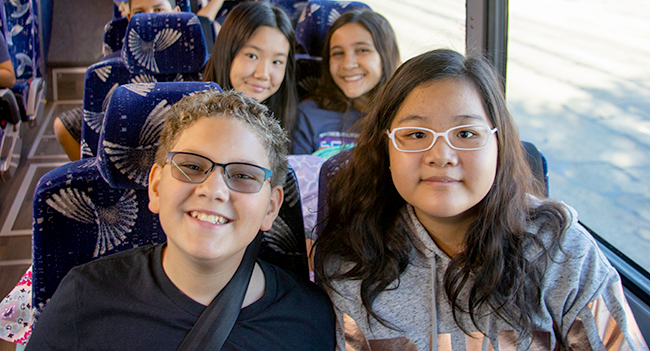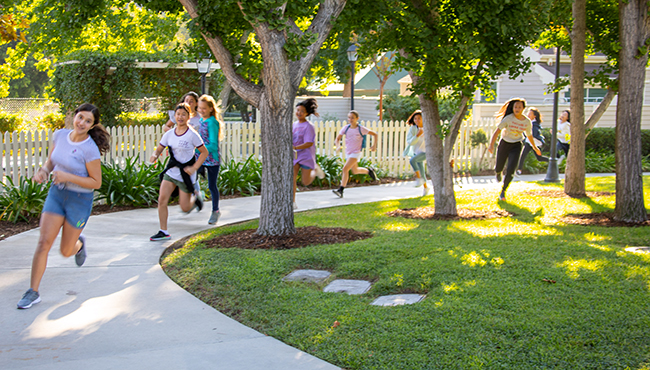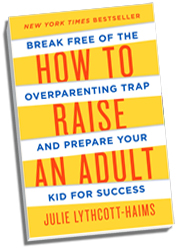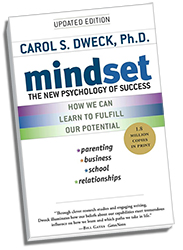
Middle school students head to the bus with their luggage to begin their three-day mountain adventure.
You are not alone! You have a parenting partner in Clairbourn School designed to support the parent’s journey as well as the student’s journey.
But, there is good news for families who may feel they are in a transition phase with their children. You are not alone! You have a parenting partner in Clairbourn School designed to support the parent’s journey as well as the student’s journey. We have experienced teachers and administrators who are ready to help with effective ideas that can support, redirect, or reframe family experiences for the better. We also have a collection of resources in the “Parenting Partner Playlist,” found on the school’s intranet called “CougarNet,” designed to support families with a host of issues that arise when raising preschool to middle-school-age children.

Clairbourn parents can utilize a collection of well-researched parenting resources in the Clairbour’s intranet website called “CougarNet.”
Using Clairbourn’s rich resources to support the family unit can go a long way to address challenging situations and point things in a new and positive direction. One mom, entering a confusing stage of parenting older children, shared “It is not always easy to know what my place is, because it is changing, so it is hard sometimes.” Clairbourn knows that a lot of parents feel that way, but one key idea to understand is that the child really still needs the parent…just in different ways!
Julie Lythcott-Haims, author of How to Raise an Adult, gives some great advice on the changing job of parents when she says, “When children aren’t given the space to struggle through things on their own, they don’t learn to problem solve very well. They don’t learn to be confident in their own abilities, and it can affect their self-esteem. The other problem with never having to struggle is that you never experience failure and can develop an overwhelming fear of failure and of disappointing others. Both of the low self-confidence and the fear of failure can lead to depression or anxiety.”
So parents, at this stage, can shift into a stronger role as confidence-builders! Older children need parents to provide opportunities that show they trust them to begin to solve things on their own. If a parent keeps lifting all the weights, so to speak, the parent will be the only one getting stronger, and the child will never build their own muscles. This means that parents have to step back, to some degree, and allow their children to work through struggles and even experience failure so their own ability can be strengthened.
Parents can begin to see themselves in a new kind of supporting role where now they act as the encourager, the cheerleader, or the coach who lets their child learn the value of tackling some problems on their own.

As children grow, parents can begin to see themselves in a new kind of supporting role where now they act as the encourager, the cheerleader, or the coach who lets their child learn the value of tackling some problems on their own. Parents are building their child’s self-esteem and confidence when they give the child opportunities to develop their own strategies to feel disappointment and then set a better plan for the next effort. When parents let their children experience independent problem-solving, they are now helping to protect them from life-disrupting pitfalls caused by fear of failure, depression, and anxiety.
When parents let their children experience independent problem-solving, they are now helping to protect them from life-disrupting pitfalls caused by fear of failure, depression, and anxiety.
It is so important to embrace this new way of being needed. As children get older, they need their parents, not so much as the main doer or problem-solver, but now as the people who encourage and believe in them.
At Clairbourn, we are helping students with this transitional stage toward independence by developing the “Growth Mindset” as described by author Carol Dweck in her book, Mindset: The New Psychology of Success. In all levels of the school experience, we help the students to reframe the temptation to say, “I can’t do it,” into the growth-mindset statement, “I can’t do it, YET!” This simple change helps the students to understand that their skills and abilities aren’t fixed, and they can improve and develop with effort and energy focused toward their goals.
This is one of the best messages that parents can reinforce with their children as they become more independent and face challenges. And, it will provide plenty of opportunities for parents to still be needed…just in a new way.















